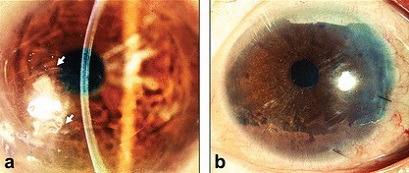COVID-19 News: Turkish Study Shows That Even Mild SARS-CoV-2 Infections Causes Changes To Corneal Endothelium And Slightly To Corneal Curvature!
Nikhil Prasad Fact checked by:Thailand Medical News Team Nov 27, 2023 2 years, 2 months, 6 days, 1 hour, 12 minutes ago
COVID-19 News: The COVID-19 pandemic has brought about a myriad of challenges, affecting individuals across the globe with a range of symptoms, from mild viral illness to severe respiratory distress. Beyond the well-documented respiratory impact, emerging studies are shedding light on the diverse effects of the virus on various organ systems, including the eyes. Recent research from Recep Tayyip Erdoğan University in Turkey and Kocaeli University Faculty of Medicine reveals intriguing findings on the subclinical changes in corneal health among individuals who have experienced mild COVID-19.
 Exploring Ocular Impact
Exploring Ocular Impact
The eyes have increasingly become a focal point in COVID-19 research due to the presence of angiotensin-converting enzyme-2 (ACE2) receptors, crucial for the entry of the virus into host cells. The cornea, in particular, has been identified as expressing ACE2 receptors, making it a potential site for SARS-CoV-2 transmission. Despite the absence of overt pathological findings, the researchers from Turkey delved into the possibility of subclinical changes in corneal structures, aiming to detect alterations that could have long-term implications for ocular health.
Methods of Investigation
The study, a prospective analysis conducted at Recep Tayyip Erdoğan, involved 56 young adults aged 23-34 who had experienced mild COVID-19. Ethical guidelines were followed, with written consent obtained from all participants. Corneal health was evaluated through a comprehensive approach, utilizing corneal topography to assess curvature and specular microscopy to delve into endothelial layer changes.
Results and Observations
The research covered in this
COVID-19 News report, yielded intriguing results, with a statistically significant change observed in endothelial cell parameters following mild COVID-19 infection. Notably, there was a decrease in endothelial cell density (ECD) after infection, indicating potential implications for corneal health. Hexagonality, a measure of cell shape uniformity, also exhibited a decrease, while polymorphism increased. These findings suggest that even mild cases of COVID-19 may impact the endothelial layer of the cornea, potentially leading to long-term consequences.
Furthermore, central corneal thickness (CCT) showed a significant increase post-infection, hinting at alterations in corneal hydration or structural changes. Corneal curvature, topographic values, and biometric measurements showed slight changes or remained relatively stable, emphasizing the specificity of changes observed in the endothelial layer.
Implications and Future Directions
Understanding the subclinical changes in corneal health post-COVID-19 is essential for early detection and management of potential long-term complications. The decrease in endothelial cell density and alterations in cell morphology may have implications for conditions such as corneal edema, graft failures, changes in refractive status, and other ocular complications.
This study paves the way for future research into the long-term effects of COVID-19 on ocular health and emphasi
zes the importance of regular ophthalmic assessments for individuals who have recovered from the virus. Early intervention and monitoring of corneal health may mitigate the risk of chronic ocular conditions, providing valuable insights for clinicians and ophthalmologists.
Conclusion
In conclusion, this Turkish study highlights the impact of mild COVID-19 on subclinical corneal changes, particularly in the endothelial layer. The findings underscore the importance of comprehensive ophthalmic assessments for individuals recovering from COVID-19, even in cases with mild symptoms. By identifying and understanding these subclinical changes, healthcare professionals can implement timely interventions to safeguard ocular health and prevent potential long-term complications. This research contributes to the growing body of knowledge on the diverse effects of COVID-19 and emphasizes the need for ongoing vigilance in monitoring and managing post-infection health outcomes.
The study findings were published as a pre proof in the peer reviewed journal: Photodiagnosis and Photodynamic Therapy.
https://www.sciencedirect.com/science/article/abs/pii/S1572100023006269
For the latest
COVID-19 News, keep on logging to Thailand Medical News.
Read Also:
https://www.thailandmedical.news/news/breaking-covid-19-news-chinese-study-discovers-that-sars-cov-2-increases-the-risk-for-developing-acute-angle-closure-glaucoma
